#intersectional religion
Text


[ Source: The World's Muslims: Religion, Politics and Society ]
https://quranx.com/4.16
If two men among you are guilty of lewdness, punish them both. If they repent and amend, Leave them alone; for Allah is Oft-returning, Most Merciful.
https://quranx.com/Hadith/AbuDawud/USC-MSA/Book-38/Hadith-4447/
Narrated Abdullah ibn Abbas:
The Prophet (ﷺ) said: If you find anyone doing as Lot’s people did, kill the one who does it, and the one to whom it is done.
Intersectionality is a mental disorder.
#islam#religion#palestine#hamas#israel#queers for palestine#gays for islam#islam for gays#intersectional religion#intersectionality#intersectional feminism#religion is a mental illness
120 notes
·
View notes
Text
As a young girl in the church I was taught to "respect myself."
We were told it from every angle. Our teachers, our preachers, our parents. "As a woman you have to respect yourselves." "How can men respect you if you're not respectful of yourself?"
I'm not sure why an 11 year old girl needed tips on how to make men respect her, but they felt it was important nonetheless.
So I educated myself and spoke my mind. I wanted to be respected for how clever I was. I asked questions that were thoughtful and well reasoned, I corrected elders when they were wrong and I focused on knowing as much as I could.
They didn't like that.
So I put all that aside, and instead I learned about feminism. I decided I should be respected for how firm I was. I said no loudly and clearly. I made my boundaries known and I reacted loudly when they were crossed.
They didn't mean like that either.
So instead, I put myself in therapy. I wanted to be respected for how self assured I was. I started caring for myself and putting me first. I healed from my trauma and learned how to not repeat old cycles, and everyone who I could, I brought them up with me.
They didn't like that at all.
No, apparently the type of self respect they wanted me to learn was the type where I beleived lies at face value, said nothing to those who crossed my boundaries and wallowed in depression and toxic cycles. But also like, while keeping my shoulders covered or something.
Silly me.
#religious trauma#anti religion#vent post#toxic parents#childhood trauma#feminist#intersectional feminism#radical feminism#feminism#feminism is for everyone
177 notes
·
View notes
Text
Me when I refuse to acknowledge that there's been 50 years of Feminism since the 70's and that the Second Wave is in fact not the end-all-be-all of Feminism.
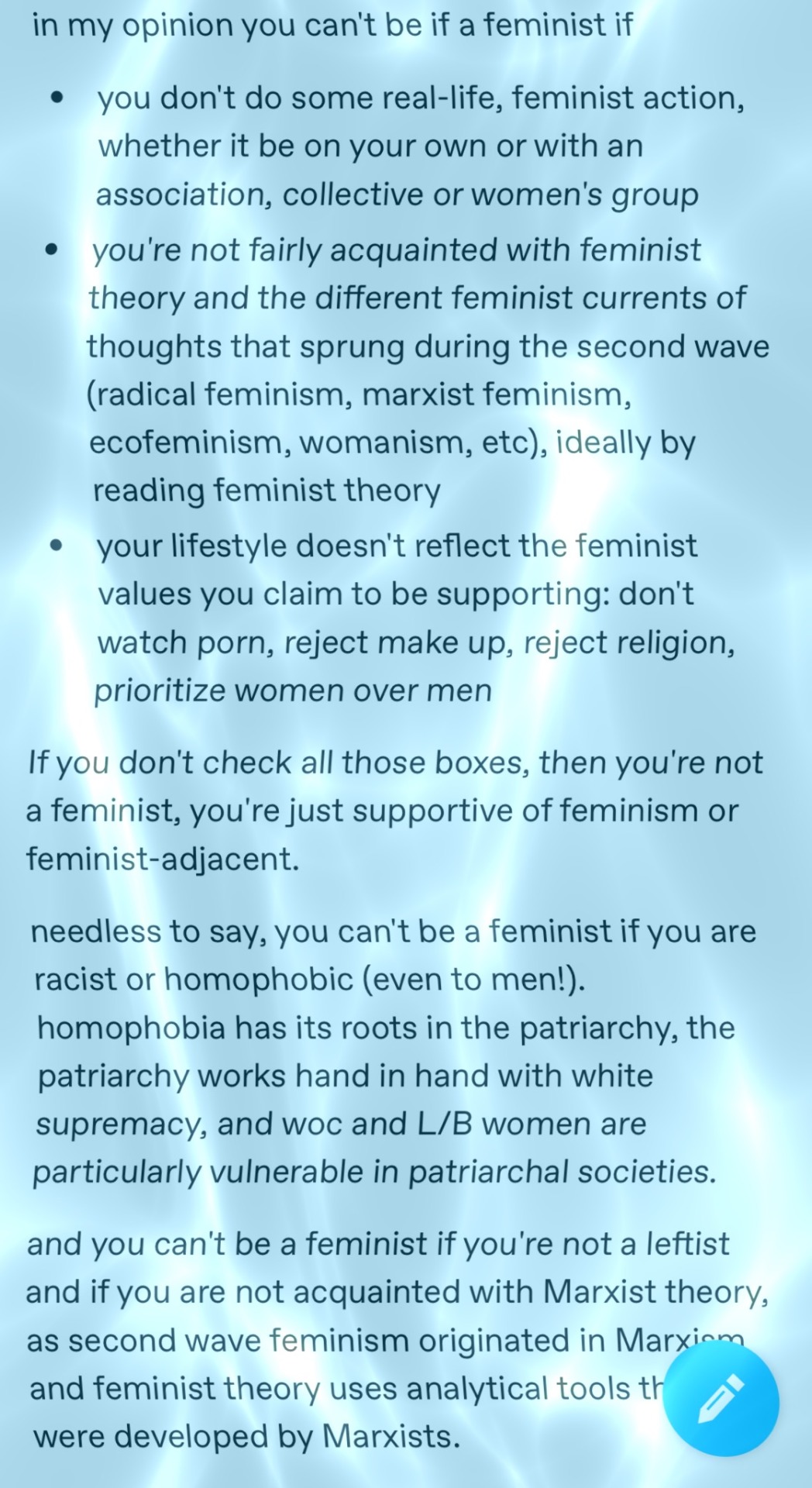
We are in fact currently in the Fourth Wave of Feminism.
I wonder what Feminist theories began popping up in the late 70's-early 80's that Radfems really don't want young Feminists to expose themselves to? I wonder if it might have to do with the fact that Black and Decolonialist Feminist theory exist, in part, as direct critiques of Radical Feminism? Womanism is a good place to start learning about early modern Black Feminism, but even Womanism exists as critique of Radical Feminist thought.
If your knowledge of Black Feminism begins and ends with Womanism from the Second Wave, you have failed Feminist studies.
I also wonder what Feminist theories have begun popping up from the 90's to present that Radfems really don't want young Feminists to expose themselves to? I wonder if it might have to do with the fact that Intersectional Feminist theory has been growing and expanding in the decades since? Maybe it has something to do with the fact that most Intersectional Feminist theory exists in direct opposition to the Radical Feminist idea that womanhood is the most oppressed class in society and that Patriarchy is the main force of oppression in the world?
It's always amazing to me when Radfems claim to be anti-White Supremacist and even acknowledge that White Supremacy and Patriarchy work in tandem, while simultaneously enforcing the idea that addressing White Supremacy is only important in the context of womanhood.
There Is No Hierarchy of Oppressions - Audre Lorde, 1 page PDF, seriously, it's only one - 1 - page, please read it.
#there's so much more i want to say about this#especially the 'reject religion' comment because holy hell way to dismiss the voices of jewish and muslim feminists especially#but i will not right now#original post#anti radfem#radical feminism#intersectional feminism
109 notes
·
View notes
Text
Unlearning Purity Culture & How To Embrace Your Sexuality
Some words on how to unlearn purity culture and embrace your sexuality on your terms. For the women, men, girls, gays, theys, and anyone else who grew up in a religious, ultra-conservative, or sex-negative environment.
Remember that no one is "tainted" from engaging in such a natural act with someone they have chemistry with. The only "damage" that can happen from consensual sex is STDs or unwanted pregnancy if you don't use protection.
From what I've seen, religious indoctrination tends to promote an otherness around sex – it is a purpose-driven act (uphold a marriage, create children), rather than an innate desire that matures just like the rest of your being (body, mind, spirit). Once you consider that your sexuality is simply a part of your human existence – like your desire for certain foods, emotions, interpersonal connections, sensory experiences, and creativity – it is easier to perceive sex as a morally-neutral act.
Because one's sexuality is so personal, you need to learn, explore, and accept your preferences at any given stage in your life. If you find the idea of casual sex or purely physically-driven sex to be unappealing, that is completely fine. Some people prefer to have sex with someone only after they've established an emotional connection or were friends with the person beforehand. Others crave more dynamic or adventurous sexual experiences that can incline them to become bored in long-term relationships. These pleasure-seekers may be more inclined to seek the thrill, novelty, and lack of inhibitions that come with casual relationships. It's like someone preferring smooth or chunky peanut butter. You might not understand why someone likes the other option, and you might change your mind over time, but neither option is inherently "good" nor "bad." Either option should align with your personal preference to ensure you're getting the most pleasure and satisfaction out of the experience.
While sex and love are not the same, you need to learn for yourself whether you prefer to have experiences that mesh or separate the two. Beneficial connections manifest in all forms. Sit with yourself honestly without judgment to pursue the path that feels most authentic to you.
#femmefatalevibe#purity culture#sexuality#sex education#sex and relationships#self discovery#femme fatale#dark feminine energy#dark femininity#it girl#feminism#intersectional feminism#patriarchy#religious trauma#dream girl#level up#higher self#self confidence#inner work#deconstructing religion#life advice#girl advice#self reflection#healing journey#self healing#self care
321 notes
·
View notes
Text
this piece is written so well, reads just like a story, that i'm struggling on which excerpts to showcase for this post. please read the whole thing when you get the chance!
“They forbade us from feeding our own before we went to feed their children. They never prohibited us physically,” she said, her jaw clenched, adding that the fear they inculcated was enough for them to obey. “They didn’t want their children nursing from the breast of a woman who had just fed an untouchable child.”
Driving her stick farther into the ground, she added: “Sons of b******.”
“I was distressed about starving my child, but I always went along with it because that is how it worked,” Narsamma said. She would be compensated sporadically. “I was paid with a sack of grains or 10 or 20 paise [less than 1 cent].”
She looked around, before adding: “Soon as I reached their premises, I was provided with a piece of soap and was asked to take a bath near the cattle shed. Which human being would want to be treated that way? I left my baby starving in the house to feed their child. And while we slaved away our bodies for them, they saw it as nothing less than their birthright to treat us like that.”
...
The women began to speak about Madiga food habits and, in particular, eating beef.
Most Hindus who are not Dalits do not eat beef because cattle are considered sacred animals, but it is a staple food for many Dalit communities like mine.
For Madigas, meat from the dead cattle our community disposed of was often our only source of food, and we became associated with consuming beef. Non-Dalits have long humiliated people who eat beef by saying they are impure. But beef was not only an easy, protein-rich source of food for my community, it also played a significant role in our nutritional customs.
Such customs have faded as our community has tried to dissociate itself from a cultural practice that we were shamed for. The marginalisation of those who eat beef has only grown since 2014 after Prime Minister Narendra Modi’s government came to power and banned the slaughter of cattle in many states, fuelling the rise of violent vigilantism against beef-eating minorities.
Beef played a particular postpartum role for Madigas. “For about 12 days following childbirth, our elders made sure we ate a nutritious diet of a different assortment of beef parts every day,” Narsamma said. “The elders carefully chalked out every day’s diet to make sure we had the strength to sustain ourselves after giving birth and to produce sufficient nutritious milk for our babies. All the castes knew about this custom and hence had a popular opinion that our women produce nutritious milk.”
The sun had nearly set, and the women fanned themselves to keep the mosquitoes away. They would soon return home to tend to their families and the evening chores.
“They humiliated us as impure and dirty every day for eating beef, but they wanted the milk of the beef eaters,” Narsamma said. “They say we polluted the air they breathed, but they wanted our bodies to feed their children.”
#dalit#resources#intersectional feminism#bipoc#madiga#narendra modi#india#casteism#caste abolition#Ramavaram#Telangana#religion#hinduism#reaux speaks#dalit feminism
110 notes
·
View notes
Text
#jews and judaism#jew stuff#jewish people#jewblr#jewish things#antisemitism#Jesus#jesus of nazareth#christianity#religion#sjw#intersectional social justice#social justice#intersectionality#intersectionalfeminism#allyship
449 notes
·
View notes
Note
how prevalent is religion in the PH universe? I'm guessing not very much and obviously it's not part of the operatives' lives but, for example, are/could there be pockets of humans who are religious? I'm not sure I'm wording this right haha I hope it's understandable
it definitely exists! ofc with the advances in science and space travel some things are recontextualised, with some beliefs becoming less prevalent and others becoming more so, but certainly science and religion aren't mutually exclusive and it's still pretty prevalent. some planets are more religious or more spiritually homogenous than others, but there's no galaxy-wide dominant religion or anything like that.
I think religion in scifi is a really interesting topic and smth worth exploring! I'm not doing it in hadea bc it's kind of beyond the scope of the game with everything else I wanted to include, so the characters are by and large generically nonpractising but that's not bc religion has been wiped out or is considered archaic or disproven on a galactic level.
#I think it's a very boring take to say that science at a certain level simply cancels out religion or spiritual belief#and I think people will always find things to believe in. I think that's part of human nature and I'd like to think more about the interpla#of that with things like AI. how does that intersect with ideas about souls??#but it's just smth that I haven't given myself the space to do properly#anon
30 notes
·
View notes
Text
thinking alot ab queer spaces in religion 4 tonite.
not sure why but a vision of like. queer churches popped into my head. like for example a church sunday but its all queer people praying and singing and being thankful and sharing life moments and organizing community support. augh. man
if this is real i want in but i like havent been invested in christianity any more than when i was taken to church semi-regularly up to my tweens. but now after taking a bunch of queer studies and intro level anthropology im like damnnnn being in a religious ceremony centered around queerness would do so much for me
i feel like queer community bonding would be so strong too with the structure of support involved in churches tbh !!!! like from what i remember and what i hear from my grandparents it just sounds so. togetherly
#i wrote this last night and woke up with it on my app so postig it ig. i think i cooked?#queer religion#< ??? if thats the correct term#for context also as a kid my family went to. methodist church i think?#this isnt just abt christianity tho ofc im talkig like any religious or spiritual identity as it intersects with queerness#text
25 notes
·
View notes
Text
the queen's deal reminds me sm of pinkwashing of military regimes: the kindly, just, accepting ruler who believes anyone can be a soldier, never mind the prejudice baked into militarism itself
#yes fruitcake even YOU can enact horrible acts of violence in the name of the state#obvi intersects w class race religion etc etc#nimona#nimona movie#vick thots
69 notes
·
View notes
Text
You might want to visit the Virtual Chapel, and simply sit in silence for a few minutes.
76 notes
·
View notes
Text
Just the entire part with Trin falling in love with his drama teacher and his mental illness that is being treated but that he's trying to find a way to cure instead and the Anurak was obviously involved in trying to 'help' him and the combination of religion and mental illness and queer love and the intersection of wanting freedom from your mental illness in queer love but finding instead a sort of comfort in religion telling you that you can pray yourself better, pray it all away only to lose every bit of it instead...
#shadow the series#thai bl#thai bl drama#bl drama#bl series#thai series#thaibl#asianlgbtqdramas#thai drama#asian lgbtq dramas#thai bl series#it's the intersection of mental illness queerneess and religion
28 notes
·
View notes
Text

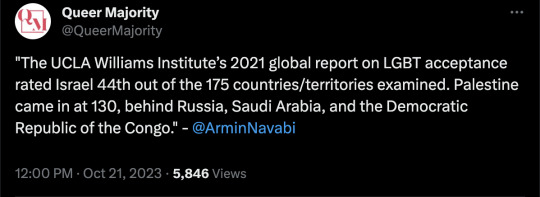

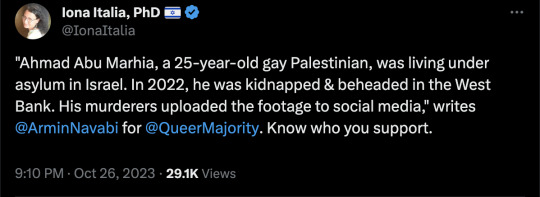
By: Armin Navabi
On the morning of the 7th of October, 2023, the Palestinian militant group Hamas orchestrated a multi-pronged assault against Israel from the Gaza Strip. Their fighters breached the heavily fortified border, committing a mass murder of more than a thousand Israeli civilians, including young children. The political discourse surrounding these brutal events and the war that has come in its wake, especially in the West, has been tinged with a misguided transposition of Western identity politics onto the Middle East that collapses all nuance and reduces a complex situation into a simple binary of “oppressor versus oppressed.” As such, leftists in English-speaking nations tend to see Palestine (including Hamas) as an oppressed, brown victim class whose freedom-fighting “resistance” against their oppressive, white, US-backed colonizers in Israel is a righteous cause with which to stand in solidarity. This simplistic view of the long-standing conflict in the Middle East leads to confused and contradictory thinking, as seen in the slogan (and now meme) “Queers for Palestine” brandished at anti-Israel rallies. It’s worth exploring just how incoherent this concept is.
On the surface, “Queers for Palestine” attempts to meld LGBT advocacy with Palestinian liberation, a juxtaposition that has precipitated a whirlpool of ridicule and criticism due to the fact that LGBT rights scarcely exist within the Muslim world, and the Palestinian territories are no exception. The slogan has been widely satirized with variations like “Chickens for KFC” or “Blacks for the KKK”, which highlight the basic lack of awareness of just how incompatible the values of the Western left are with the Islamic right they so readily champion.
The reality of the situation could not be more stark. Though it has much room to improve, Israel is at the forefront of LGBT rights in the Middle East. In Israel, LGBT people are visible members of society with legal protections, civil rights, and a plurality of public acceptance.
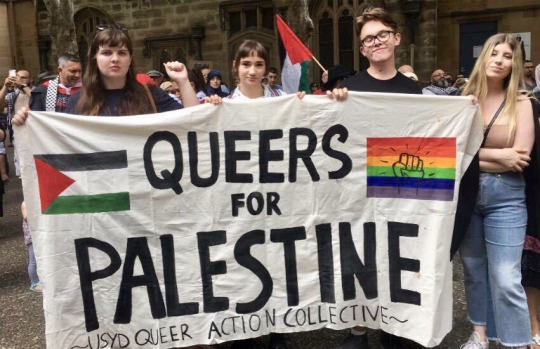
Palestine, by contrast, is quite a different story. The UCLA Williams Institute’s 2021 global report on LGBT acceptance rated Israel 44th out of the 175 countries/territories examined. Palestine came in at 130, behind Russia, Saudi Arabia, and the Democratic Republic of the Congo. Georgetown University likewise placed Palestine 160th out of 170 countries on their women’s peace and security index, in good company with most of the region. Amnesty International’s 2020 report on human rights highlights the criminalization of male same-sex relationships in Gaza, punishable by up to 10 years' imprisonment, with a conspicuous absence of legal protections against anti-LGBT discrimination or harassment. This lack of civil rights has led hundreds of gay and bi Palestinians to flee to Israel to escape persecution. One such refugee, Ahmad Abu Marhia, a 25-year-old gay Palestinian man, was living under asylum in Israel. In 2022, he was kidnapped and beheaded in the West Bank city of Hebron. His murderers uploaded footage of the killing to social media.
However, every time these disparities are mentioned, critics are quick to lob accusations of "pinkwashing" — a concept invented to frame any discussion of Israel’s progressive stance on LGBT issues as a distraction from their mistreatment of Palestinians. The fact remains that these “Queers for Palestine” could march in Pride parades in Israel if they wanted to. In Palestine, they’d better be wearing iron neck guards if they don’t want to lose their heads.
Another disconcerting element of “Queers for Palestine” is that it popped up in prominent left-wing anti-Israel/pro-Palestine rallies in the immediate aftermath of Hamas’s terrorist attacks, before Israel had the chance to respond. As such, there is no way to interpret this slogan and the surrounding leftist fervor except as a signal of support not merely for Palestine, but specifically for Hamas, the jihadist movement with the explicit aim of eradicating the state of Israel. It's imperative to understand that Hamas, as detailed in its 1988 Covenant, is propelled by a fundamentalist Islamist ideology with the goal not only of eliminating all Jews but also conquering the world — just like ISIS. Senior Hamas official Mahmoud al-Zahar was recorded saying, “The entire planet will be under our law, there will be no more Jews or Christian traitors.”

[ One of the many memes that the original “Queers for Palestine” image spawned. ]
Western support for Hamas, under the guise of Palestinian liberation, overlooks the deep-seated radical Islamist ethos driving the organization, which, if unbridled, would jeopardize the very freedoms cherished by LGBT people across the developed world. Anyone who doubts this should try being gay, bi, or trans in most of the Middle East and North Africa’s (MENA) Muslim-majority countries. Virtually all of these nations have laws that criminalize homosexuality and being trans, some of which carry the death penalty. Human Rights Watch’s "Everyone Wants Me Dead" report succinctly encapsulates in its title alone the perilous environment faced by LGBT individuals in these regions.
Many on the Western left, including the LGBT left, have become enamored with Critical Social Justice, which provides a warped lens through which they perceive all of humanity as oppressors versus oppressed classes. Armed with this simplistic, binary worldview, leftists gravitate toward perceived liberation movements for other so-called oppressed groups. This narrow prism, however, obscures the universalist ideology of Islamism espoused by groups like Hamas, which, under a facade of anti-imperialist rhetoric, harbors a brutal dogma that is antithetical to the liberties and rights championed by LGBT activists. No amount of screaming about “pinkwashing” can drown out the irony of folks who believe in LGBT liberation cheerleading ideological movements from which they would flee as refugees.
To be sure, the Palestinian people have suffered more than their fair share, and it’s easy to see how the Palestinian resistance narrative can carry the allure of righteous rebellion, especially for factions of the hard left who have their own aspirations of a large-scale dismantling of our liberal society. The vicarious thrill of romanticized revolution that leads some to go far beyond simply advocating for the Palestinian people and expressing solidarity with Hamas, ignores the jihadist ideologies at the core of such organizations. These ideologies are oppressing LGBT Palestinians at this very moment, and given half a chance, they would oppress the very leftists now voicing support for the Palestinian cause. And, indeed, this has happened before.
The aftermath of the 1979 Islamic Revolution in Iran is a harrowing tale of leftists being tortured and executed en masse by the very Islamic regime they supported for the sake of their anti-imperialist goals. Many Iranians who aligned with leftist organizations supported the revolution only to find themselves persecuted by Islamists they helped put in power.
Immediately following the revolution, the new regime led by Ayatollah Khomeini began systematically oppressing LGBT people and publicly executing them by the thousands. These atrocities were justified as a means to "eliminate corruption" and prevent the "contamination" of society. Between 4,000 to 6,000 gay, lesbian, and bi people have been executed since the 1979 Islamic Revolution. Iran’s legal system, rooted in Islamic law, criminalizes consensual sexual relations between same-sex individuals, with penalties ranging from lashes to death. Iranian law does not distinguish between consensual and non-consensual same-sex intercourse, allowing authorities to prosecute both perpetrators and victims of sexual assault.
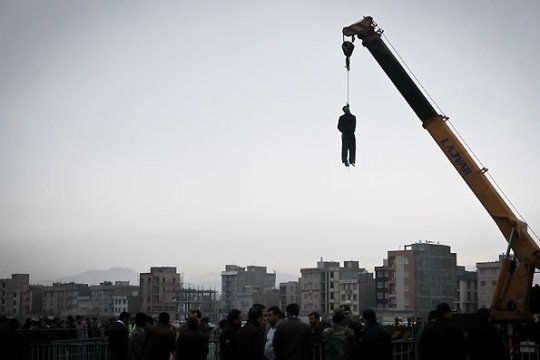
[ Source: The Algemeiner ]
Images of gay and bi men hanged from cranes so that they may slowly suffocate to death serve as grim reminders for anyone interested in human rights: align with Islamic fundamentalists at your peril.
"Queers for Palestine", and the nuanced realities it glosses over, underscores the need for a more informed and discerning discourse — a discourse that transcends catchy slogans and moral binaries and delves into the complex, often discordant ideologies at play in the Israel-Palestine conflict. That way, we can advocate for a better future without bolstering forces antithetical to liberal values, and without betraying LGBT people by undermining their very rights and freedoms. We can’t do that while overwriting the complicated dynamics of a 75-year foreign conflict with our own provincial identity politics.
==
Intersectionality is an institutionally acquired neurological disorder.
#Armin Navabi#queers for palestine#palestine#hamas#free palestine#israel#intersectional religion#intersectionality#intersectional feminism#intersectional activism#mental illness#mental disorder#the death of irony#useful idiots#chickens for KFC#islam#islamic terrorism#islamic supremacy#hamas covenant#religion is a mental illness
29 notes
·
View notes
Text
Christians be like "worship God or be punished" as if that doesn't sound exactly like an abusive boyfriend
#radfem#radblr#radical feminists please interact#radical feminist community#radical feminism#intersectional feminism#feminism#ex catholic#ex cath#ex christian#religious trauma#religion critical
196 notes
·
View notes
Text
I've done work with incarcerated women (no I'm not custody staff nor in mental health) and one thing a woman shared with me was that what lead her to being imprisoned was absolutist thinking.
She was extremely liberal and her mind dealt with the abstract by being devout in her political and personal beliefs. She gave me an example of her considering herself pro gay marriage. If you didn't believe in gay marriage she wouldn't even talk to you. It was the same for other liberal beliefs she had: abortion, anti-guns, etc.
She also enjoyed scientific theories and became so driven by attempting to understand the truth in physics that she would slip into delusional thinking.
I don't want to provide exact details, but eventually this absolutist and delusional thinking resulted in the end of someone's life. She's now incarcerated. She's one of the most brilliant and genuine people I've met.
But let the moral of the story be that it's so important to be able to have nuanced discussions with people you don't agree with and think critically. You can listen to and hear someone out without accepting their beliefs. And just because you're liberal or left leaning doesn't mean you're immune to extremeism, it just comes in a different form. This pertains to any group: transgender activists, conservatives, radical feminists, intersectional feminists, toris, democrats, vegans, Christians, etc.
Extremeism isn't always reflected in what the belief is. It's how you believe and what the mind does over time in response to how you believe. Don't rely on the people you surround yourself with as a measure of reality. She thought she was fine because her friends all believed in the same way. Over time she only associated herself with people who held the same belief in how to believe, which only further validated her to refuse listening to any other perspectives. Some minds are driven to find the absolute within the subjective to the point of delusion, paranoia, or extremeism. And there's a lot of subjectiveness to social justice, activism, spirituality, politics, and social theory.
#social justice#activism#human rights#feminism#lgbt#transgender#feminist#trans#lgbtq#gender identity#gender#liberal#conservative#spirituality#religion#politics#queer rights#pro life#pro choice#intersectional feminism#intersectionality#trans rights#trans discourse#discourse#mental health#mental health conditions
88 notes
·
View notes
Note
(possible cw? NSFW)
what advice do you have for trying to be more sex positive?
the way i was raised (cis female) i experienced a lot of purity culture and whatnot so now 95% of sex related things/media/conversations i feel shame/embarrassment or even just uncomfortable bc i don't know how to talk about it/it was shunned growing up.
i don't really desire to try anything (bdsm, roleplay, etc). but i hate being so uncomfortable at the sheer thought of it when i'm alone in a room by myself. (like it's to a point where if I'm alone watching tv and a sex scene comes on i'm like "what if someone walks in and sees this" as if i'm doing something wrong).
i'm also not really into the hookup culture thing either, i've tried it and it's just not for me.
but i've started seeing someone new and i don't want to be uncomfortable around him in any way, trying to break old patterns and whatnot.
i have no problem exploring/masturbating but again, i feel out of my element otherwise.
i don't know where to even start when it comes to sex positivity/embracing sexuality. please help??
(ps i love ur blog)
Hi love! Thank you so much <333
I'm sorry that you had the all-too-common experience of being shamed for your sexuality (such a natural thing, ugh). I'm glad to hear that you're comfortable exploring your own body and being intimate with people you feel a connection to – both of those aspects of intimacy are very important! But please know it's so common for women to feel shame surrounding their sexuality. It's programmed into us (at least in many countries/cultures) since we're very young.
I think the best place to start is to understand that, at least for those of us who aren't asexual, desiring sex and sexual pleasure is as natural as craving chocolate – we're hardwired to seek out pleasure and avoid pain. If something feels good, we're going to want to keep doing it.
Once you fully acknowledge that you can't out-shame yourself out of a natural craving/desire, I think it gets a bit easier to begin integrating this aspect of your being into your personhood. Learning what makes you feel good, turns you on, and makes you feel sexy/desired – alone or partnered – can become a part of your self-discovery journey, not a taboo side to your existence/interpersonal experiences.
Hope this helps xx
#sex education#sex advice#sexuality#female sexuality#female pleasure#female power#women's rights#women's health#gender norms#purity culture#deconstructing religion#female empowerment#women's empowerment#intersectional feminism#feminist#feminism#self discovery#higher self#femme fatale#dark femininity#dark feminine energy#q/a#femmefatalevibe
20 notes
·
View notes
Note
so like. how does it work practicing a religion that in part revolves around a river 12,000 km from you
For a moment I thought you meant the Ganghes and I wondered if you were conflating Hinduism with Buddhism because that's what nowadays forms the majority of my practice. But I think you mean me being Kemetic and the river you mean is the Nile.
Truth be told there is no consensus and to some extent the whole community is experimenting with it! Comes with the territory of reconstructing a religion from archaeological evidence.
As a bit of a case study why don't we take Wep Ronpet, Egyptian New Year. The theme of the holiday in antiquity was the beginning of the flood season which renewed the fertility of the Nile valley, equated to Zep Tepi, the primordial time of creation. Among modern Kemetics it has a meaning similar to the secular New Year: out with all the negativity and chaos of the year past, in with the new.
Opinions differ as to exactly when to celebrate Wep Ronpet. The event commemorated simply does not happen anymore. Since the construction of the Aswan Dam in 1960-1970 the Nile does not flood annually, so that cannot be the benchmark.
Some Kemetics mark it with a fixed date, usually around northern hemisphere summer to coincide with the ancient date. Agust 15th (September 11th in the Julian calendar) to coincide with the Coptic Orthodox Church's Feast of the Martyrs, the direct modern descendant holiday of Wep Ronpet still celebrated in Egypt, or July 18th for the date during the New Kingdom period.
Other Kemetics may celebrate it based on their own region's agricultural calendar. If I was doing it like this here in Guatemala I could perhaps do it around May or June which is the time of year when rainfall first spikes and the famous zompopos the mayo (a type of leafcutter ant that thrives in humidity, scientific name Atta cephalotes) begin to come out.
Finally, and most popularly, many kemetics base it around the date of the heliacal rising of sirius, a once-yearly astronomical event that used to coincide fairly close to the flooding of the Nile and was as such used in antiquity to estimate the date. Since the exact date of the heliacal rising varies depending on where on the globe you are opinions differ as to what to base the calculations off of. Members of The House of Netjer base it off their main temple in Illinois where former Nisut (pharaoh) Dr. Tamara L. Siuda resides. Others base it off the date in Egypt itself. And yet others base it off their own location.
I personally am partial to August 15th for entirely personal and practical reasons. I live in Guatemala City, August 15th is a public holiday because the patron saint of the city is The Virgin of the Assumption. So The Feast of the Assumption of the Holy Virgin Mary on August 15th, both a pan-Catholic holiday and specifically a local holiday I get a day off for is fitting I think. A very specific rejection and recontextualization of the religion I was raised with.
And that's what practicing a reconstructed religion comes down to, I believe. Weaving together the threads of history, archaeology, and anthropology to forge your own relationship with the cultural and spiritual practices that speak to you from these ancient cultures.
#kemetic#kemeticism#religion#by the way while I do not mind answering these at all#I'd much rather redirect them to my main (@aerial-jace) for when it does not intersect with WC or my fics kay?
9 notes
·
View notes